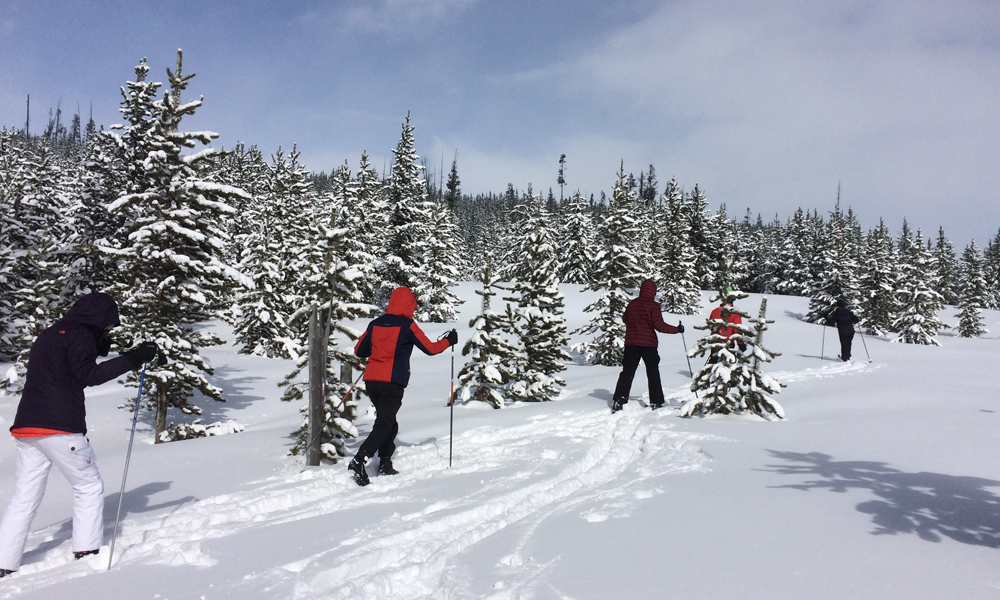The Most Beautiful Views Come After the Hardest Climbs

By Joanna Manning
Two feet of fresh snow has fallen on Yellowstone National Park in the biggest winter storm of the season. The temperature, with wind chill, has plummeted to -20. Conditions are inhospitable at best. Still, a group of Charles Wright Academy upper school students is cross country skiing here as part of the annual Winterim experience. They are alone in the park save for the occasional bison and elk, cutting their own trails through the wilderness.
The skiing is physically demanding work, and nearly all of the students are novices. Every hour, the group breaks at a warming hut that is not, in fact, very warm, evidenced by the layer of ice that has formed on the inside of the windows. Despite the harsh conditions, every student is eager to get back out onto their skis at the end of each break, to push themselves just a little harder, to see what new terrain they might explore.
On the trail, the students play word games and tell each other riddles. There’s talk of home, of the history of the park, of the geology of the caldera they are skiing in, the one that blew debris as far as Texas during its last eruption. They encourage each other, even though they are all struggling with something about the experience, whether it’s technical proficiency or the elements. Sometimes they simply stand together for a moment in silence, marveling at the absolute stillness of the park. At the end of each day, they fall into bed exhausted and proud, buoyed by the knowledge that they have persevered through something hard, the kind of challenge that has made them a little bit stronger, a little bit more resilient.
Upper school Japanese teacher Stephanie Glenn, one of the faculty leaders of the Yellowstone trip, speaks to the value of this kind of experience from an educator’s perspective. “The ability to mentor, teacher-to- student and really student-to- student is key.” Relationships are formed outdoors that may not exist easily in the classroom. Charles Wright faculty are always seeking new ways to connect with students, and outdoor education provides a unique avenue to do so. “You may have one view of a student in a classroom situation,” Glenn notes, “but if you put them in a totally different context– some will struggle and some will shine. Either way, we see each other in a completely different way.” This new understanding helps faculty nurture the potential in each student. “We provide so many opportunities for kids to shine at this school. We expose them to so many different open doors. They’re going to shine somewhere.” By week’s end, the Yellowstone group has formed a bond that would not have seemed possible at the outset of the trip, a bond forged both through their shared adversity and through their chance to authentically connect with one another face-to- face, without the distractions of the frenzied world at home. And the time spent unplugged has helped them connect not just to each other but to the beauty of the wilderness and the intensity of their experience, carving out space for stillness and reflection that is increasingly hard to find.
The outdoor education program is one of the most memorable elements of a Charles Wright education. When alumni get together, they are quick to reminisce about their outdoor trips, remembering all of the hard stuff– the blisters, the exhaustion– with a certain fondness. Brooke Judge ’97 recalls how important teamwork became in the midst of her outdoor experiences: “To know that people have lifted you and carried you, even if for just a moment, is something special. You realize that you couldn’t have gotten through the experience alone.” Fostering this kind of cooperation is among the stated goals of the outdoor education program, as is developing a sense of self reliance and the ability to cope with challenges of all sorts. These are goals that the program seems to be achieving in spades. In describing his 10th-grade backpacking trip, a grueling, five-day hike through rugged terrain, alumnus Cooper Cochran ’17 sums up the value of his experience with a kind of credo that he continues to live by: “The most beautiful views come after the hardest climbs.”
Experiential education generates exceptional opportunities in active, collaborative learning. Our 2018 Spirit Auction Fund-A-Need is dedicated to enhancing experiential learning for students of all ages. Even if you don’t plan to attend the auction this year, impact the future of our learners by making a gift online at:
charleswright.ejoinme.org/fundaneed
Your gift can help us lead the way.


